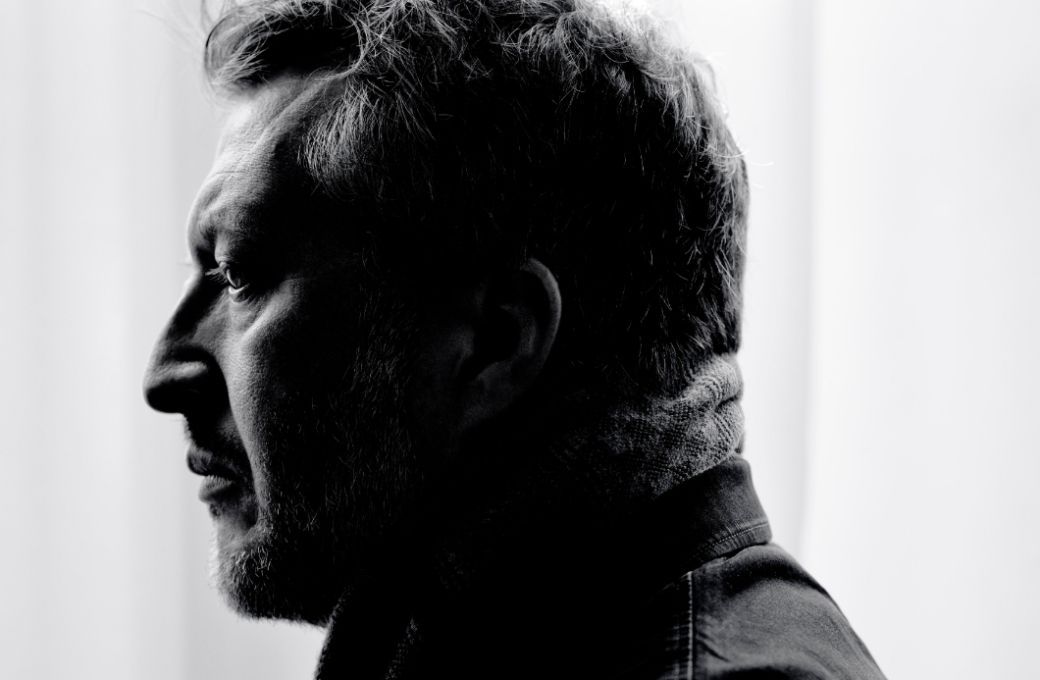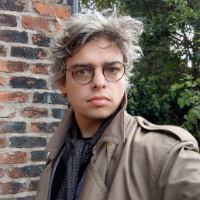How exactly do composers show up in their own works? It’s windy and brightly overcast in Manchester and I’m sat in a chair opposite Thomas Adès in his dressing room before he’s due to rehearse with the Hallé. The metal venetian blind on the open window behind noisily rustles and fidgets. It can be hard to hear him over the noise. Backlit like this it’s even hard to see him.

“It’s always an aspect of any artist, that they reveal themselves. Even if they set out not to. It works the other way. They just are there, but it’s a kind of version of themselves.” A few days earlier, Adès was performing Janaček’s Concertino, for piano and small ensemble. Janaček’s programme for the piece imagines each theme adopting the character of a different creature the composer encounters on a walk – a hedgehog, squirrel, night owl, etc. “He’s depicting the animals, and thereby revealing himself.”
Later in the evening Adès is conducting Michael Tippett’s strange Triple Concerto. While much of Tippett’s music still remains little-known, the composer is enjoying a modest revival, with recent performances of his last, occasionally baffling opera New Year. I ask how Tippett shows up in this concerto. “There’s a strong feeling of costume, of manners, of certain types of Baroque dance… It feels like this hat, then another hat, the various elements of costume at once.”
“And then at the heart of the piece,” Adès says, “is this very serene and beautiful and quite ‘un-English’ utterance. After all the costumes and the theatrical elements of the other parts, there’s this very sincere, beautiful melody – with these gongs.” Tippett had recently returned from a journey to Bali. “I think it is rather a self-revelation, as perhaps an Englishman of a certain age who goes to a place like that, so spiritually different, who has an ‘ah!’-type epiphany. I think you can hear it in the music. I don’t know if he set out to reveal himself or not!”
Tippett’s gregariousness and eclecticism seem distinctive features of his music. “It’s very ‘I want it all’. Gobble it up. It has this great inclusiveness, it’s Beethovenian in that sense. He wants the whole universe, all of us to be brothers,” Adès says.
“I never actually met Tippett, but I believe that he was a playful, rather joyful character, and of course had a great sympathy for the underdogs and the dispossessed…” (Tippett’s mother Isabel Kemp was briefly imprisoned as a suffragette.) “He used to pronounce the word ‘dance’ in the northern way, because he thought it was lighter. He didn’t like the sound of ‘dahnce’. We found that quite a lot in playing the music, it’s very light on its feet… It gives his work a profoundly joyful quality, a very optimistic composer.” Alexander Goehr said he couldn’t stand Tippett’s optimism, I say. “Haha! So typical! That’s very good – well there we are.”
When I hear the piece later, it is indeed weird and costumed, with a bizarre and touching cod-Balinese middle section. Aside from Tippett and Janaček, in his other Manchester concerts Adès performs pieces by younger composers, including a new piece by William Marsey titled Man with Limp Wrist, Alex Paxton’s Dadd’s Fairies and Oliver Leith’s Cartoon Sun. Marsey’s piece is droll and riven with understatement; Paxton and Leith are full-saturation colour-fests. All are ironic and self-aware in a way that Tippett somehow isn’t quite.
“They said, you can do anything you want here,” Adès says, referring to the Hallé. “So as a result, it’s been an opportunity to feature works like this. They don’t seem to mind that it may not be an absolutely jam-packed Bridgewater Hall.” I ask about Gerald Barry, who’s the composer I most associate Adès with as a conductor. “I did a lot of Gerald’s music, maybe 13 or 14 pieces, including a bunch of operas. That to me was – I don’t know what the word is – a correction, in my mind. For me personally, his music was a real lifesaver in a way.”
I can hear Barry in William Marsey’s piece, I wager. “It might just be the same impulse, I don’t know… You know there are families in music. But they’re all so very different. It’s tricky for me to perform something I really don’t like, there needs to be something in it that I understand, that I can read, mentally. If I can’t, I do struggle.” I ask a little gingerly: Is there something to do with ‘camp’ in all these composers’ music? Is it something he ever thinks about?
“Absolutely not.” Adès frowns. “That really is one of those… it depends on the person. I think I know what you mean, but I don’t think it’s the whole story in any of those cases…” He shuffles. “Maybe I’m camp! But I find you can turn these words on to all sorts of things. Like, to me, for example, music which is exaggeratedly solemn, pompously sober, I find that unintentionally funny – which therefore is camp. If something is too grey and grim and boring, I start getting the giggles, so that to me is camp. So you see it depends where you’re standing.”
I ask about Adès’ newest orchestra piece, Aquifer, recently premiered in Munich. I’m reminded of the opera The Exterminating Angel with its constant feeling of things running under the surface (“Underground rivers,” he offers). There’s also a natural connection to the ballet Dante, his other recent project.
“Yes! By coincidence,” he says. “I’d gone back into the score of Exterminating Angel during the pandemic.” (The orchestral Exterminating Angel Symphony was made during this time.) “And I even listened back to a couple scenes, which I hadn’t done. I hate to listen to my own stuff, which is silly of me, that’s a flaw, I should be listening and learning. But I was listening and thought, ‘where are the horns, the horns didn’t come in’, and then I looked at the score and realised, ‘oh I didn’t put them in’.” He chuckles. “I was worried about balance, I didn’t quite know how strong the singers’ voices were going to be. So for the Symphony I reinforced everything.”
The second production of The Exterminating Angel, in Paris, has just been staged, with score similarly buttressed. “While I was working on these, not revisions but reinforcements to the score, I was also writing Aquifer. I think something of that…” he hesitates. “My sort of obsession with voice-leading, I get so obsessed with it to the extent it almost swallows everything up. I think that’s where the water analogy comes in. Because it’s so strong for me, it’s like the force of water. And with an aquifer, my understanding is that, water simply looks for the channel that it can use, it’s a geological formation… To me, that was what I was providing for my material, which is the water, the musical material. That’s what the piece is.”
The piece is quite big – or at least, concerned with bigness, I venture. “Again it depends where you’re standing… I have a theory that every piece of music has to have a zero-point at some stage… But it’s all a question of how big or otherwise the space is that you’re deciding to fill or not fill. In Aquifer I wanted the pressure of it to be so great that… the whole orchestra is like a big instrument, quivering, on the verge of exploding in saturation. In Asyla there’s only one or two brief moments that are saturated like that. I want more! There’s quite a few in this piece.”
When I hear it live with the Hallé, with Adès conducting, he’s obviously right, the orchestra does become a big quivering instrumental mass. The ending too, is a big moment. “Yes. C major you see,” he says. “I’ve got this theory that that’s the ideal condition of any piece, that they should end in C major. But not many of them actually manage it.”
In Manchester, Adès also conducts his enormous and rarely-performed orchestral piece Tevot, for an orchestra of quintuple-woodwinds, the size of The Rite of Spring. But, he emphasises, size is not so easily quantifiable. “These things all depend on your own perspective. I recently had a premiere in Copenhagen, a string quintet, that I was working on partly at the same time, very much in the other direction. Not short, probably as long, if not longer than Aquifer.” The new piece Wreath was performed by the Danish String Quartet, with an additional cello.
“I always think of that Schubert quintet they played with it – that many people would say, ‘It’s so long! So many repeats!’ But you’re hearing it in a certain way – it’s domestic music but also cosmic at the same time. These things all depend… How big is a person? To that person, they’re pretty much everything, but to anyone else you’re just an ant.” Wreath is an important personal and compositional departure for Adès, particularly in the way the music is assembled. “The whole texture, the surface texture that you hear, is not notatable or controlled by me. To manage to do that… I sort of had to do it, especially after the extreme levels of control in Aquifer. I don’t feel it in terms of large or small, in quite the same way.”
“There is a question of finding one’s scale in the universe”, he muses. “That’s something artists always find themselves doing, whether consciously or not.” Adès shuffles in his seat and his edge dissolves slightly into the backlight.
Thomas Adès returns to Bridgewater Hall to conduct the Hallé on 27th March.
See all upcoming performances by Thomas Adès.


